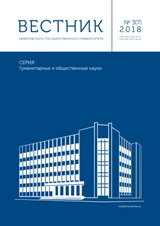St. Petersburg, Russian Federation
St. Petersburg, Russian Federation
UDC 81
The article features specifics of the Master degree program "Theory of Translation and Intercultural / Interlingual Communication" at Peter the Great St. Petersburg Polytechnic University. The authors review and evaluate such organizational forms of educational activity as translation disciplines, research work (R&D), and translation practice. They analyze the didactic aspects of the main discipline "Theory and practice of the first foreign language translation" as related to the main features of the scientific and technical register, i.e. terminology, standardization, and impersonality. The typology of parallel texts is considered in the context of pre-translational analysis as an important didactic component of teaching a two-way translation. For pre-translational analysis, it is recommended to use thematically relevant and professionally translated texts, fragments of machine translation of technical discourse, and a translation-oriented visualization of translation fragments. Technical translation requires not only linguistic skills but also general mental skills that are necessary for scientific work. Abstract and summary translations, as well as translation editing, help to involve students in scientific activities.
technical translation, linguist, discipline, R&D, practice, scientific and technical register, parallel texts, universal skills of mental labor
1. Tarasova E. S. Obuchenie pisʹmennomu perevodu tekhnicheskoi dokumentatsii spetsialistov neiazykovykh spetsialʹnostei (na primere patentov i rukovodstv po ekspluatatsii) [Technical documentation translation teaching of non-linguistic specialists (on the example of patents and maintenance manuals)]. Vestnik Tomskogo gosudarstvennogo pedagogicheskogo universiteta = Tomsk state pedagogical university bulletin, no. 10 (2010): 71-75.
2. Vlasova I. V., Nechaeva A. A. Obuchenie tekhnicheskomu perevodu kak chasti kompleksnoi obrazovatelʹnoi programmy v protsesse obucheniia studentov inostrannomu iazyku v tekhnicheskom vuze [Teaching technical translation as a part of the complex educational program in the process of teaching a foreign language to students in the technical institution of higher education]. Filologicheskie nauki. Voprosy teorii i praktiki = Philological Sciences. Issues of Theory and Practice, no. 6-3 (2017): 189-191.
3. Didaktika perevoda. Khrestomatiia i uchebnye zadaniia [Translation didactics. Reader and study tasks]. Comp. Bazylev V. N., Krasilʹnikova V. G. Moscow: FLINTA, 2017, 128.
4. Shurlina O. V. Trudnosti "lokalizatsii" kak lingvokulʹturnoi adaptatsii tekstov programmnogo obespecheniia [Translation difficulties of software "localization"]. Vestnik Voronezhskogo gosudarstvennogo universiteta. Seriia: Lingvistika i mezhkulʹturnaia kommunikatsiia = Proceedings of Voronezh State University. Series: Linguistics and intercultural communication, no. 1 (2014): 83-87.
5. Shereshevskii L. A. Osobennosti lokalizatsii programmnogo obespecheniia na primere SCADA-sistemy WinCC [Features of software localization on the example of a WinCC SCADA system]. Promyshlennye ASU i kontrollery = Industrial ACS and controllers, no. 7 (2004): 34-38.
6. Alekseeva I. S. Professionalʹnyi trening perevodchika [Professional translator training]. Saint-Petersburg: Soiuz, 2003, 288.
7. Tsaturova I. A., Kashirina N. A. Perevodcheskii analiz teksta. Angliiskii iazyk [Translation analysis of the text. English]. 2nd ed. Saint-Petersburg: Perspektiva, Soiuz, 2008, 296.
8. Smekaev V. P. Angliiskii iazyk. Sovremennyi tekhnicheskii perevod [English. Modern technical translation]. Moscow: R. Valent, 2014, 360.
9. Remacha E. S. Infotech. English for computer users. 4th ed. Cambridge University Press, 2008, 168.
10. Klimzo B. N. Remeslo tekhnicheskogo perevodchika. Ob angliiskom iazyke, perevode i perevodchikakh nauchno-tekhnicheskoi literatury [Craft technical translator. About English, translation and translators of scientific and technical literature]. Moscow: R. Valent, 2011, 488.
11. Evteev S. V., Semenov A. L. Perevod: parallelʹnye teksty i sistemy "pamiatʹ perevodchika" [Translation: Parallel Texts and "Translation Memory"]. Vestnik Rossiiskogo universiteta druzhby narodov. Seriia: Lingvistika = The Russian Journal of Linguistics, no. 3 (2014): 128-139.
12. Meshkov O., Lembert M. Praktikum po perevodu s russkogo iazyka na angliiskii [Workshop on translation from Russian into English]. Moscow: NVI-TEZAURUS, 2000, 116.
13. Sankina V. V. Formirovanie metaumenii na osnove tekhnologii razvitiia kriticheskogo myshleniia cherez chtenie i pisʹmo [Formation of meta-ideas based on the technology of developing critical thinking through reading and writing]. Inostrannye iazyki v shkole = Foreign languages at school, no. 9 (2014): 9-14.
14. Solovova E. N. Chtenie v sostave universalʹnykh uchebnykh deistvii: pozitsii FGOS i traditsionnoimetodiki obucheniia inostrannym iazykam [Reading in the composition of universal educational actions: positions of the Federal State Educational Standards and traditional methods of teaching foreign languages]. Inostrannye iazyki v shkole = Foreign languages at school, no. 4 (2014): 2-15.
15. Iovleva V. I., Popova N. V. Perevodcheskie aspekty v nauchnoi deiatelʹnosti aspirantov [Translation aspects in the scientific activity of graduate students]. Aktualʹnye problemy iazykoznaniia = Actual problems of linguistics, vol. 7 (2018): 218-224.
16. Chernetsov P. I., Shadchin I. V. Metodologicheskie podkhody k formirovaniiu gotovnosti studentov vuza k nauchno-issledovatelʹskoi deiatelʹnosti [to the question on formation of readiness of students of high school to scientific-research activity]. Sovremennye problemy nauki i obrazovaniia = Modern problems of science and education, no. 1 (2012). Available at: http://www.science-education.ru/ru/article/view?id=5478 (accessed 19.04.2018).


















